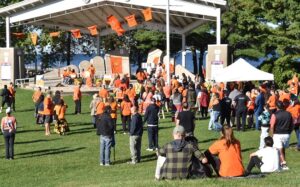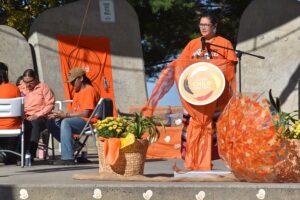Hundreds in step for Every Child Matters Walk on Orange Shirt Day

By Kelly Anne Smith
NORTH BAY—Hundreds of people wearing orange t-shirts listened, walked, and feasted together during the Every Child Matters Walk on September 30.
The Anishinabek Nation, North Bay Indigenous Hub, and North Bay Indigenous Friendship Centre called the solemn gathering at the Kiwanis Bandshell overlooking Lake Nipissing. where folks were offered smudge and others held tobacco ties.
Maurice Switzer, North Bay Indigenous Friendship Centre Board President and citizen of Mississaugas of Alderville First Nation, opened the day in a good way.
“This event was one of the 94 Calls to Action of the Truth and Reconciliation Commission. It was intended as a day of learning…I like to tell Indigenous boys and girls that there’s nothing they can’t achieve, despite what happened in the past, there’s nothing they can’t achieve if they are given the same opportunities as other people. There have even been two Indigenous astronauts, so even the sky isn’t the limit anymore.”
Executive Director of the North Bay Indigenous Friendship Centre Kathy Fortin followed calling September 30 a day to remember.
“To remember the ones that didn’t make it home, but also remembering the ones that did make it home that are still suffering from the traumas of the past. Today is the day to remember how resilient we are as an Anishinaabe people, the things we went through in the past, and walking forward today.”

Anishinabek Nation Grand Council Chief Linda Debassige from M’Chigeeng First Nation reminded the crowd that the last Indian Residential School closed in 1997.
“The stories of Survivors, their grandchildren, and all relatives and children of our Survivors as well, listening to their many stories, also with families of Survivors, is very insightful. It helps a young person like me understand where some of our traumas come from. But also creates the opportunity to help start that healing work.”
Grand Council Chief Debassige acknowledged the strength of the Survivors that continue to tell their stories today.
“The ones who have spoken out about the horrors and abuses that they faced while attending Residential School but most importantly, their resilience. That teaches us that we can be stronger together. And it also teaches us that we can do more to support our families. And when we understand where the trauma comes from, we can come together as communities united, strong and resilient,” states Grand Council Chief Debassige. “It’s important to know that without our Survivors, the Truth and Reconciliation Commission would never have come about – the lawsuits, the settlements, the apologies. It’s their voice that helped bring us to today.”
She then turned to elected leaders, reminding them of their responsibility to Indigenous people.
“We are relying on you to also use your voices to amplify ours to ensure we have the support necessary to complete this sacred healing work and to find all of our children. Those who are missing and those who disappeared. And you have a responsibility to ensure that the support and the resources continue unimpeded. And this is the responsibility you have as a part of reconciliation.”
Lauree Linklater-Pizzale, Executive Director of the North Bay Indigenous Hub, talked about taking time to reflect where you are on your healing journey, or as allies, what you can do to dismantle the systemic racism and hurtful policies within institutions. She called her late mother Pauline a Residential School Warrior and shared her words.
“Help one another. Love one another. These can be some guiding words for us all as we make social change to enable positive outcomes for our people.”
Nipissing First Nation’s Chantal Larocque, Sergeant with the Anishinabek Police Services, says policing has come a long way.
“I believe in the way we police with the Seven Grandfather Teachings, when you police with your heart.”
Survivor of Shingwauk Indian Residential School Judy Couchie from Nipissing First Nation thanked the allies of Indigenous peoples.
“You don’t know what it means to see a non-[Indigenous] person sit and listen and not criticize.”
Couchie deflects deniers.
“Here, in Residential Schools it was only [Indigenous] children who had to go and they wanted to wipe all our history out of us,” she explains. “There was a struggle coming into these years because people don’t really understand the trauma that a lot of our Survivors, some have not survived. Some lost themselves to the street. I’m fortunate because once I identified what I was through, I took the counselling for twelve years to get through this. And there’s times when I still have to call a counsellor. But I know I’m a Survivor and I know I’m strong. And I want all our people to be strong.”
The Nbisiing Redhawks Drum Group from Nbisiing Secondary School was grateful to accept semaa to be part of the day, reflects proud drum teacher Tory Fisher.
“The drum is the heart beat of our nations and we had this taken away from us at one time, which makes it that much more meaningful to bring back, especially for Residential School Survivors. Seeing these students pick up these sacred items and use them again provides so much strength and healing to our nations.”
Phyllis Webstad is Northern Secwpemc from Stswecem’c Xgat’tem First Nation, and was only six years old when she was separated from her family and forced into Indian Residential School.
At the Mission, Phyllis had her brand new orange shirt stripped from her that her grandmother had just bought for her. The colour orange always reminded Phyllis of feeling worthless, that her feelings didn’t matter, and no one cared. The Orange Shirt Society’s Every Child Matters honours the children who never came home and the Survivors.
The National Day for Truth and Reconciliation on September 30 began in 2021.


